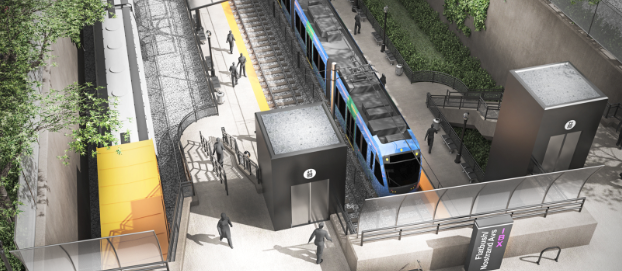Op-Ed: The Interborough Express will take years before the first rider boards, but its impact is already being felt, in conversations about connectivity, rent, property values and in hopes whispered by commuters who dream of shorter rides.
On a typical rush hour morning, I watched a line of people wait for the B60 bus in East Flatbush. Parents with kids tugging at their hands. Nurses in scrubs sipping coffee. Older neighbors leaning on canes. The ride to downtown Brooklyn can stretch well over an hour, and for those who work in Queens, it’s even longer.
Now imagine cutting that commute in half, without ever setting foot in Manhattan. That’s the promise of the Interborough Express (IBX), a proposed rail line that would run from Bay Ridge to Jackson Heights, turning an old freight corridor into a new passenger connection.
Brooklyn is always changing. Between 2023 and 2025, we’ve seen thousands of new housing units rise, new businesses take root, and plans emerge to resurrect old rail lines. Here’s one sharp stat: nearly 900,000 residents and 260,000 workers live or work along the proposed Interborough Express corridor, making it one of the most consequential transit ideas for our borough in decades.
As true Brooklynites, we’ve learned to live with the love-hate relationship we have with the Metropolitan Transportation Authority. We gripe about delays, joke about “signal problems,” yet still clutch our MetroCards (soon to be OMNY taps) because the system is how we get to work, school and family. As the Interborough Express project enters its design phase, Brooklynites like me are left asking: how will this train change our neighborhoods? And who will it truly serve?
The Interborough Express isn’t just about moving people faster. It’s about time, money and access.
This summer, the MTA board approved to launch the IBX design phase. One detail worth celebrating: this project will reuse existing rail lines. By building alongside freight tracks rather than carving out entirely new space, the IBX lowers costs and minimizes displacement—a rare win when it comes to big infrastructure. The ride across boroughs is projected to take about 32 minutes, a dramatic improvement over today’s patchwork of buses and transfers.
For a single parent balancing two jobs, saving thirty minutes on the road isn’t just convenient—it could mean making it to a parent-teacher conference or cooking dinner at home. For small business owners, a line of commuters passing through daily could translate into new customers and opportunities.
The train won’t pull into its first station for years, with service expected in the early 2030s. But today is when we start preparing, financially, strategically, and with a clear view of what kind of Brooklyn we want to live in when the doors finally open. If the project delivers as promised, local economies could blossom. Picture bodegas in East New York serving morning commuters. Or a teacher in Midwood suddenly able to take a job in Queens without a grueling transfer through Manhattan.
Another ripple effect will be the cost of living. Already, some real estate brokers in Kensington and Midwood are hinting that buyers should “get in early” before the train drives up home prices. For homeowners, this sounds like a blessing. Small business owners might see new customers, too.
I don’t believe buying a home is the only—or always the best—path to wealth. But when it makes sense, investing in real estate can be a smart long-term move. The key is making sure the timing and your finances line up. A stable income, manageable debt, and reserves for emergencies are essentials before making the leap.
The Interborough Express will take years before the first rider boards. But its impact is already being felt, in its bold statement that Brooklyn deserves direct, modern infrastructure connecting its own communities, not just serving as a bridge to somewhere else; in conversations about rent; in speculation on property values; and in hopes whispered by commuters who dream of shorter rides.
The question is not whether the train will change Brooklyn. It will. The question is whether that change will lift us all, and I’m hopeful it will, if we prepare wisely, and that it won’t leave too many behind.
Lisa Jane Celestine is a Brooklyn resident and the founder of Greendiggers, LLC, a financial education and coaching company.

